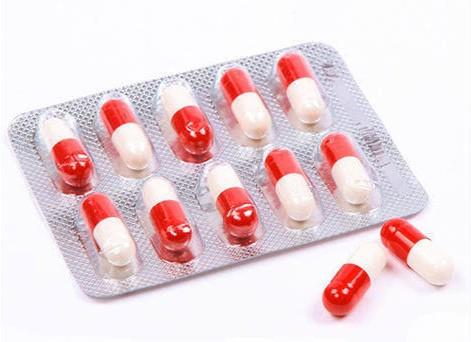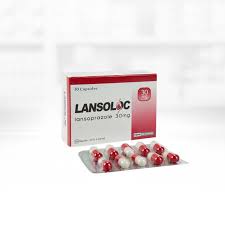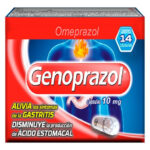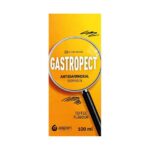Lansoloc 30: Uses, Dosage, Side Effects, Price

Lansoloc is a South African brand of lansoprazole capsules produced by CIPLA, It contains lansoprazole 30 mg as active ingredient.
Lansoloc oral capsule is used as part of a combination therapy. This means you may need to take it with other medications. Lansoloc oral capsule is used to reduce the amount of acid in your stomach. It can be used to:
• treat gastric ulcers (stomach ulcers) or duodenal ulcers
• treat heartburn due to gastroesophageal reflux disease (GERD)
• treat erosive esophagitis (a condition with inflammation and ulcers in the esophagus)
• prevent and treat stomach ulcers due to use of nonsteroidal anti-inflammatory drugs (NSAIDs)
• treat hypersecretory conditions (where your stomach makes too much acid), such as Zollinger-Ellison syndrome
• treat a stomach infection caused by Helicobacter pylori (H. pylori) in combination with an antibiotic.
How Lansoloc works
Lansoprazole belongs to a class of drugs called proton pump inhibitors. A class of drugs is a group of medications that work in a similar way. These drugs are often used to treat similar conditions. Lansoloc works by decreasing the amount of acid produced in your stomach. It does this by blocking the proton pump in the cells of your stomach. The proton pump works in the final step of acid production. When the proton pump is blocked, your stomach makes less acid. This helps to decrease your symptoms.
What special precautions should I follow?
Before taking Lansoloc,
• tell your doctor and pharmacist if you are allergic to lansoprazole, any other medications, or any of the ingredients in Lansoloc capsules or orally disintegrating tablets. Ask your doctor or pharmacist for a list of the ingredients.
• tell your doctor if you are taking rilpivirine (Edurant, in Complera, Odefsey). Your doctor will probably tell you not to take Lansoloc if you are taking this medication.
• tell your doctor and pharmacist what prescription and nonprescription medications, vitamins, and nutritional supplements you are taking or plan to take. Be sure to mention any of the following: certain antibiotics, including anticoagulants (blood thinners) such as warfarin (Coumadin), atazanavir (Reyataz), dasatinib (Sprycel), digoxin (Lanoxicaps, Lanoxin), diuretics (‘water pills’), erlotinib (Tarceva), iron supplements, itraconazole (Onmel, Sporonox), ketoconazole (Nizoral), lopinavir/ritonavir (Kaletra), methotrexate (Trexall, Xatmep), mycophenolate mofetil (Cellcept), nelfinavir (Viracept), nilotinib (Tasigna), rifampin (Rifadin, in Rifater), ritonavir (Norvir, in Viekira XR), saquinavir (Invirase), tacrolimus (Prograf), theophylline (Theo-24, TheoChron), and voriconazole (Vfend). Your doctor may need to change the doses of your medications or monitor you carefully for side effects.
• tell your doctor what herbal products you are taking, especially St. John’s wort. Your doctor may tell you not to take St. John’s wort while taking Lansoloc.
• if you are taking sucralfate (Carafate), take it at least 30 minutes after you take Lansoloc.
• tell your doctor if you have or have ever had a low level of magnesium in your blood, low levels of vitamin B-12 in your body, osteoporosis, an autoimmune disease (condition in which the body attacks its own organs, causing swelling and loss of function) such as systemic lupus erythematosus, or liver disease.
• if you plan to take nonprescription lansoprazole, first tell your doctor if your heartburn has lasted 3 months or longer or if you have experienced any of the following symptoms: lightheadedness, sweating, or dizziness along with your heartburn; chest pain or shoulder pain; shortness of breath or wheezing; pain that spreads to your arms, neck, or shoulders; unexplained weight loss; nausea; vomiting, especially if the vomit is bloody; stomach pain; difficulty swallowing food or pain when you swallow food; or black or bloody stools. You may have a more serious condition that cannot be treated with a nonprescription medication.
• tell your doctor if you are pregnant, plan to become pregnant, or are breastfeeding. If you become pregnant while taking lansoprazole, call your doctor.
• if you are 70 years of age or older, do not take this medication for a longer period of time than recommended on the product label or by your doctor.
• if you have phenylketonuria (PKU, an inherited condition in which a special diet must be followed to prevent mental retardation), you should know that the orally disintegrating tablets may contain aspartame, which forms phenylalanine.

How should I take Lansoloc?
Use Lansoloc exactly as directed on the label, or as prescribed by your doctor and read all medication guides or instruction sheets. Lansoprazole is usually taken before eating. Read and carefully follow any Instructions for Use provided with your medicine. Ask your doctor or pharmacist if you do not understand these instructions.
Swallow the Lansoloc capsule whole and do not crush, chew, break, or open it. Use lansoprazole for the full prescribed length of time, even if your symptoms quickly improve.
Call your doctor if your symptoms do not improve or if they get worse while you are taking Lansoloc. Some conditions are treated with a combination of lansoprazole and antibiotics. Use all medications as directed.
If you use Lansoloc for longer than 3 years, you could develop a vitamin B-12 deficiency. Talk to your doctor about how to manage this condition if you develop it.
Store at room temperature away from moisture, heat, and light. Do not freeze the liquid medicine.
Is Lansoloc safe during pregnancy?
No, Lansoloc is not usually recommended during pregnancy and while breastfeeding. If you’re pregnant, it’s always better to try to treat your indigestion without taking a medicine.
What are the side effects of Lansoloc?
Lansoloc may cause side effects. Tell your doctor if any of these symptoms are severe or do not go away:
- constipation
- nausea
- headache
- dizziness
- diarrhea
- nausea
Some side effects can be serious. If you experience any of the following symptoms, call your doctor immediately:
- rash
- blistering or peeling skin
- hives
- swelling of the eyes, face, lips, mouth, tongue, or throat
- difficulty breathing or swallowing
- hoarseness
- increased or decreased urination, blood in urine, fatigue, nausea, loss of appetite, fever, rash, or joint pain
- irregular, fast, or pounding heartbeat
- excessive tiredness
- dizziness
- lightheadedness
- muscle spasms, cramps, or weakness
- jitteriness
- uncontrollable shaking of a part of the body
- seizures
- severe diarrhea with watery stools, stomach pain, or fever that does not go away
- rash on cheeks or arms that is sensitive to sunlight.
Lansoprazole may cause other side effects. Call your doctor if you have any unusual problems while you are taking the medication.
People who take proton pump inhibitors such as Lansoloc may be more likely to fracture their wrists, hips, or spine than people who do not take one of these medications.
People who take proton pump inhibitors may also develop fundic gland polyps (a type of growth on the stomach lining). These risks are highest in people who take high doses of one of these medications or take them for 1 year or longer. Talk to your doctor about the risk of taking Lansoloc.
If you experience a serious side effect, you or your doctor may send a report to the Food and Drug Administration’s (FDA) MedWatch Adverse Event Reporting program online (http://www.fda.gov/Safety/MedWatch) or by phone (1-800-332-1088).
Frequencies of Undesirable Effects
Frequencies are defined as common (≥ 1/100 to < 1/10); uncommon (≥ 1/1,000 to < 1/100); rare (≥1/10,000 to <1/1,000); very rare (<1/10,000), not known (cannot be estimated from the available data).
| Common | Uncommon | Rare | Very rare | Not known | |
| Blood and lymphatic system disorders | leucopenia, thrombocyto-penia, eosinophilia | anaemia | pancytopenia, agranulocytosis | ||
| Immune system disorders | anaphylactic shock | ||||
| Metabolism and nutrition disorders | hypomagnesaemia (see section 4.4) | ||||
| Psychiatric disorders | depression | hallucination, insomnia, confusion | visual hallucinations | ||
| Nervous system disorders | headache, dizziness | paraesthesia, vertigo, restlessness, somnolence, tremor | |||
| Eye disorders | visual disturbances. | ||||
| Gastrointestinal disorders | vomiting, nausea, diarrhoea, stomach ache, constipation, flatulence, dry mouth or throat, fundic gland polyps (benign) | pancreatitis, candidiasis of the oesophagus, glossitis, taste disturbances | colitis, stomatitis | ||
| Hepatobiliary disorders | increase in liver enzyme levels | hepatitis, jaundice | |||
| Skin and subcutaneous tissue disorders | urticaria, itching, rash | petechiae, purpura, erythema multiforme, photosensitivity, hair loss, | Stevens-Johnson syndrome, toxic epidermal necrolysis | subacute cutaneous lupus erythematosus (see section 4.4) | |
| Musculoskeletal and connective tissue disorders | fracture of the hip, wrist or spine (see section 4.4), arthralgia, myalgia | ||||
| Renal and urinary disorders | interstitial nephritis | ||||
| Reproductive system and breast disorders | gynaecomastia | ||||
| General disorders and administration site conditions | fatigue | oedema | angioedema, fever, hyperhidrosis, anorexia, impotence | ||
| Investigations | increase in cholesterol and triglyceride levels, hyponatremia |
Lansoloc OTC price
Lansoloc OTC Capsules 15mg 14’s cost R 62.95 on Dischem, while 15mg Capsules 7 Capsules cost R 41.99 on Clicks.





